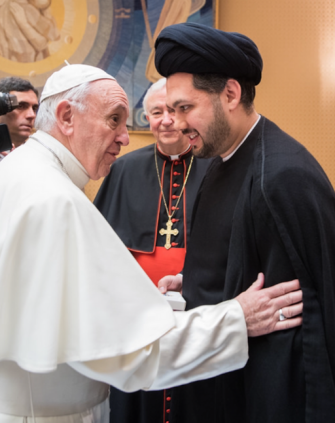Mary – Maryam 3
Bible
The Annunciation, the visitation of the angel Gabriel to Mary, is told by Luke in his Gospel (Lk 1:26-38). The name of Mary is mentioned last in the account, after that of the messenger, Gabriel, that of the place where the event takes place, Nazareth, and that of the man to whom Mary is betrothed, Joseph. Mary is described as “a young girl” (parthenos in Greek, often translated ‘virgin’). The angel addresses her: “Rejoice, so highly favoured, the Lord is with you.” Mary is disturbed by this greeting. The angel tells her that she is to bear a son whom she must name Jesus, who will “be great and will be called the Son of the Most High”, and who will be given “the throne of his ancestor David”. After being reassured by the angel about how this will happen, through the action of the Holy Spirit, Mary consents to this mission, saying: “I am the handmaid of the Lord… let what you have said be done to me.”
Qur’an
The Qur’an recounts the Annunciation in two places:
Mention in the Scripture the story of Mary… We sent Our Spirit to appear before her in the form of a normal human. She said, “I seek the Lord of Mercy’s protection against you: if you have any fear of Him [do not approach]!” but he said, “I am but a Messenger from your Lord, [come] to announce to you the gift of a pure son.” She said, ”How can I have a son when no man has touched me? I have not been unchaste,” and he said, “This is what your Lord said: ‘It is easy for Me – We shall make him a sign to all people, a blessing from Us.” And so it was ordained: she conceived him (Q 19:16-22).
Some comments on this passage:
‘Our Spirit’ (rûḥa-nâ) is translated ‘Our angel’ by Yusuf Ali. This angel appears to Mary as a young man, so she is naturally disturbed. She has recourse to God’s protection; the usual way of doing this in Arabic is to say: a’ûḏu bi-Llâhi – I seek refuge in God. It is noticeable that Mary invokes the protection of the Lord of Mercy (al-Raḥmân). This Name of God is used frequently in sura 19 which is a Meccan sura belonging to the period of the Qur’an in which there is much reference to previous Scriptures.
The angel says he has come ‘to announce to you the gift of a pure son’ (li-ahaba la-ki ghulâmanzakiyyan – literally ‘that I give to you a pure boy’).
This boy is to be ‘a sign’ from God, and ‘a blessing’ (raḥmatan minnâ –literally, a mercy from Us).
We made the son of Mary and his mother a sign (Q 23:50).
Mary and Jesus form a single sign together because they are proof of God’s power to bring forth a child from a virgin.
The second description of the Annunciation contains some differences:
The angels said to Mary: “Mary, God has chosen you and made you pure: He has truly chosen you above all women. Mary, be devout to your Lord, prostrate yourself in worship, bow down with those who pray.” This is an account of things beyond your knowledge that We reveal to you [Muhammad]: you were not present among them when they cast lots to see which of them should take charge of Mary… The angels said, “Mary, God gives you news of a Word from Him, whose name will be the Messiah, Jesus, son of Mary, who will be held in honour in this world and the next, who will be one of those brought near to God. He will speak to people in his infancy and in his adulthood. He will be one of the righteous.” She said, “My Lord, how can I have a son when no man has touched me?” [The angel] said, “This is how God creates what He will: when He has ordained something, He only says ‘Be’ and it is (Q 3:2-47).
It is good to notice some of the special features of this passage:
First, the text says ‘angels’, in the plural, like the messengers who came to Abraham to say that his wife would bear him a son.
Then, there is the description of Mary as chosen by God, pure and devout. She has been chosen by God “above all women”. This causes difficulty for some Muslims, because some see Khadija, the first wife of Muhammad, as the highest ranking woman; others give this position to Fatima, daughter of Muhammad and mother of his two grandsons, Hasan and Husayn. Accordingly, some Muslims interpret this passage as meaning that Mary was chosen above all the women of her time.
It can be noticed that the consent of Mary is not required. She has no fiat to give. God’s will is necessarily done.









Make A Comment
Comments (0)